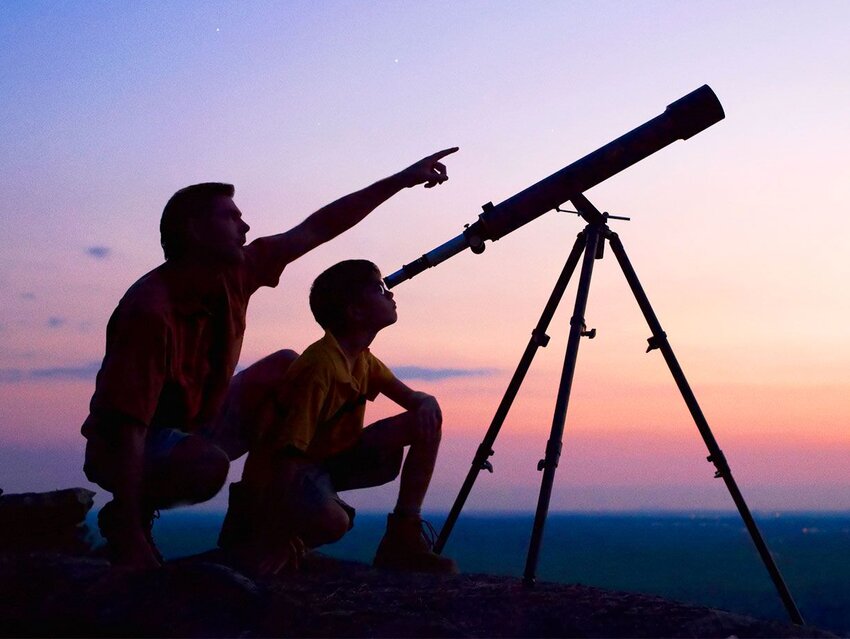Every day, scientists learn more about the mysteries of space through analysis and exploration, and each discovery needs a name. Some of them are rich in context, such as with Jupiter and its moons. The Romans named the visible planets after their gods, with the largest named “Jupiter” after the king of the gods. Thousands of years later, in 1610, Italian astronomer Galileo Galilei spotted several moons circling Jupiter. Collectively, the first four moons observed are called the “Galilean satellites,” and, individually, they were given names related to Zeus (Jupiter’s counterpart in Greek mythology) — Io, Europa, Ganymede, and Callisto. The gas giant planet has dozens of known moons, many of which have Zeus-related monikers, but the most recently discovered are lacking that poetry, such as EJC 0061.
Future discoveries and observations in space will likely receive the Jupiter treatment, but the basic terms of space exploration also have fascinating etymologies.
Black Hole
Nothing — not even light — can escape from a black hole, because its gravity is so strong that it pulls everything inside. Initially, these dangerous interstellar regions were called “dark stars” or “gravitationally collapsed objects.” Then, in the 1960s, physicist Robert H. Dicke compared the phenomena to the Black Hole of Calcutta, an infamous prison where few left alive. The flashy and terrifying name stuck.
Comet
This celestial object is an icy rock shooting through space. When comets fly close to the sun, they let off gas and dust, and begin to form tails. That’s probably why they were named for the Ancient Greek word komḗtēs, which translates to “longhaired.” Various long-tailed objects have been observed in the sky since 240 BCE, though it wasn’t until 1705 CE that astronomer Edmond Halley discovered that the same comet was orbiting past Earth roughly once every 76 years. Halley’s Comet will reappear in 2061.
Cosmos
Twentieth-century pop culture gave us pink Cosmopolitans and the antics of Cosmo Kramer, but the word “cosmos” is much broader — everything in existence, in fact. The term “cosmos” means “the universe seen as a well-ordered whole.” It comes from the Ancient Greek kosmos, which means "order, good order, orderly arrangement," and Pythagoras was the first to use this term in the 7th century BCE.
Galaxy
A “galaxy” is a system filled with loads of stars held together by gravity. The term originally comes from the Greek word for the Milky Way — galaxías. It translates to “milky circle,” which is sort of what our galaxy looks like in the sky.
According to Greek mythology, Zeus had a baby named Heracles with a human woman. He knew his goddess wife, Hera, wouldn’t be thrilled, so he tricked her into breastfeeding Heracles while she was asleep so the baby could become immortal. When Hera found out, she pushed little Heracles away, and her milk spilled across the sky—creating the Milky Way.
While many of the names for celestial elements come from Greek mythology, other cultures and languages draw their own inspiration. In Finnish a galaxy is called Linnunrata, which translates to “path of the birds,” and in Armenian it’s hard goghi chanaparh, or “straw thief’s way,” both based on local folklore.
Gravity
Gravity keeps us grounded — literally. It’s the force that pulls matter together. In space, gravity becomes weaker compared to its pull on Earth, and humans who have traveled to space feel a sense of weightlessness. The term comes from the Latin word gravitas, which means “weight.” If a person “has gravitas,” their opinion might carry a lot of figurative weight or importance.
Moon
A natural satellite that orbits a planet is called a moon. Some of the planets in our solar system have multiple moons, but Earth only has one (and was identified first), which is why it has the proper noun “Moon.” The name is derived from the Proto-Indo-European word mēnsis, which means "month.” It takes approximately one month for the Moon to pass through all its phases (which was discovered to be the length of time it takes for the Moon to travel around the Earth).
Satellite
Objects that orbit around another object are called satellites. The term comes from a French word with Latin roots, satellite. It refers to an attendant who waits on a distinguished person. In space, natural satellites are usually called moons. However, artificial satellites have been around since 1957, when the Soviet Union launched Sputnik 1 to orbit the Earth.
Universe
The universe is all around. It’s all of space and time. It’s everything that ever has and will exist. While that can be staggering to comprehend, the word has been used since the 1580s. The Latin term universum means "all things, everybody, all people, the whole world."
Featured image credit: stevecoleimages/ iStock

